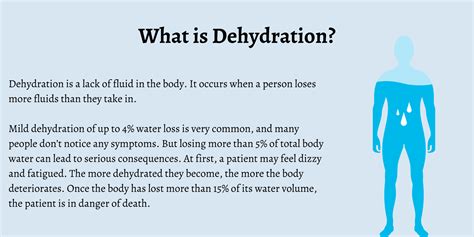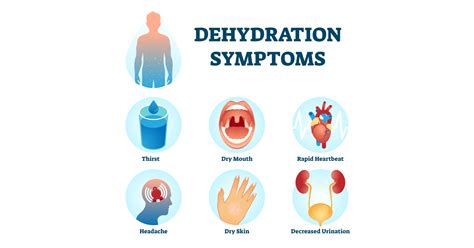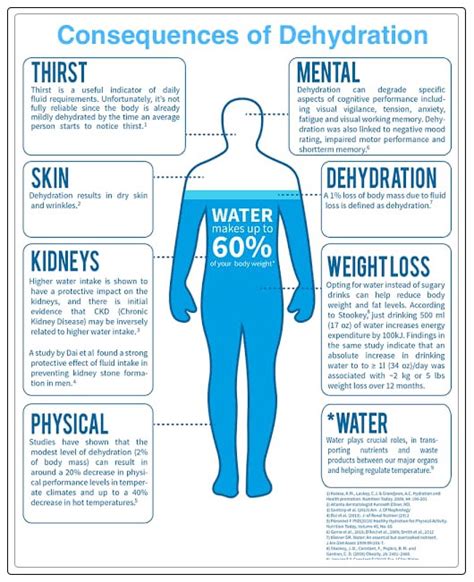Intro
Identify mild dehydration symptoms, including fatigue, headaches, and dry mouth. Learn to recognize early signs of dehydration, such as dark urine and dizziness, to prevent severe hydration issues and maintain optimal fluid balance and overall health.
Dehydration is a common condition that occurs when the body loses more fluids than it takes in, causing an insufficient amount of water and other fluids to carry out its normal functions. Mild dehydration symptoms can be subtle and may not always be immediately noticeable, but it's essential to recognize them to prevent the condition from worsening. Dehydration can affect anyone, regardless of age or health status, and it's particularly common in people who engage in strenuous physical activity, live in hot climates, or have certain medical conditions.
Mild dehydration can be caused by various factors, including inadequate fluid intake, excessive sweating, vomiting, diarrhea, and certain medications. When the body loses fluids, it can disrupt the balance of electrolytes, such as sodium, potassium, and chloride, which are essential for maintaining proper fluid balance and nerve function. Even mild dehydration can cause symptoms that can impact daily life, such as fatigue, headaches, and difficulty concentrating. If left untreated, dehydration can lead to more severe complications, including heat stroke, kidney damage, and even death.
Recognizing the symptoms of mild dehydration is crucial to prevent the condition from progressing to more severe stages. Some common symptoms of mild dehydration include dry mouth, dark yellow or amber-colored urine, fatigue, headaches, and dizziness or lightheadedness. People with mild dehydration may also experience decreased urine output, dry skin, and constipation. In some cases, mild dehydration can cause muscle cramps, joint pain, and decreased athletic performance. It's essential to be aware of these symptoms and take steps to address them promptly to prevent dehydration from becoming more severe.
Understanding Dehydration

Dehydration occurs when the body loses more fluids than it takes in, causing an imbalance in the body's water and electrolyte levels. The human body is composed of approximately 60% water, which is necessary for various bodily functions, such as regulating body temperature, transporting nutrients and oxygen to cells, and removing waste products. When the body loses fluids, it can disrupt these functions, leading to dehydration. There are three types of dehydration: mild, moderate, and severe. Mild dehydration is the most common form and can be treated with oral rehydration therapy, while moderate and severe dehydration require medical attention.
Causes of Dehydration
Dehydration can be caused by various factors, including: * Inadequate fluid intake * Excessive sweating * Vomiting * Diarrhea * Certain medications * Medical conditions, such as diabetes, kidney disease, and heart failure * Climate and environment, such as hot and humid weatherRecognizing Mild Dehydration Symptoms

Mild dehydration symptoms can be subtle and may not always be immediately noticeable. However, it's essential to recognize them to prevent the condition from worsening. Some common symptoms of mild dehydration include:
- Dry mouth
- Dark yellow or amber-colored urine
- Fatigue
- Headaches
- Dizziness or lightheadedness
- Decreased urine output
- Dry skin
- Constipation
- Muscle cramps
- Joint pain
- Decreased athletic performance
Treatment and Prevention
Treatment for mild dehydration typically involves oral rehydration therapy, which involves drinking fluids that contain electrolytes, such as sports drinks or coconut water. It's essential to drink small amounts of fluid frequently to help the body absorb the fluids and electrolytes. In addition to oral rehydration therapy, there are several steps that can be taken to prevent dehydration, including: * Drinking plenty of fluids, especially water * Avoiding excessive sweating * Eating foods that are high in water content, such as fruits and vegetables * Avoiding caffeine and alcohol, which can exacerbate dehydration * Taking regular breaks to rest and hydrate, especially in hot and humid weatherComplications of Dehydration

If left untreated, dehydration can lead to more severe complications, including:
- Heat stroke
- Kidney damage
- Electrolyte imbalance
- Shock
- Death It's essential to seek medical attention immediately if symptoms of dehydration worsen or if there are signs of severe dehydration, such as:
- Severe thirst
- Dark urine or decreased urine output
- Sunken eyes
- Low blood pressure
- Rapid heartbeat
- Confusion or disorientation
At-Risk Populations
Certain populations are more susceptible to dehydration, including: * Older adults * Young children * People with certain medical conditions, such as diabetes, kidney disease, and heart failure * People who engage in strenuous physical activity * People who live in hot and humid climates It's essential for these populations to take extra precautions to prevent dehydration, such as drinking plenty of fluids, avoiding excessive sweating, and taking regular breaks to rest and hydrate.Conclusion and Next Steps

In conclusion, mild dehydration symptoms can be subtle and may not always be immediately noticeable, but it's essential to recognize them to prevent the condition from worsening. By understanding the causes, symptoms, and treatment of dehydration, individuals can take steps to prevent dehydration and ensure proper fluid balance. If symptoms of dehydration worsen or if there are signs of severe dehydration, it's essential to seek medical attention immediately.
Final Thoughts
Dehydration is a common condition that can affect anyone, regardless of age or health status. By being aware of the symptoms and taking steps to prevent dehydration, individuals can reduce their risk of developing this condition. It's essential to drink plenty of fluids, avoid excessive sweating, and take regular breaks to rest and hydrate, especially in hot and humid weather. By taking these precautions, individuals can help ensure proper fluid balance and prevent dehydration.What are the symptoms of mild dehydration?
+The symptoms of mild dehydration include dry mouth, dark yellow or amber-colored urine, fatigue, headaches, dizziness or lightheadedness, decreased urine output, dry skin, constipation, muscle cramps, joint pain, and decreased athletic performance.
How can I prevent dehydration?
+To prevent dehydration, drink plenty of fluids, especially water, avoid excessive sweating, eat foods that are high in water content, avoid caffeine and alcohol, and take regular breaks to rest and hydrate, especially in hot and humid weather.
What are the complications of dehydration?
+If left untreated, dehydration can lead to more severe complications, including heat stroke, kidney damage, electrolyte imbalance, shock, and death.
Who is at risk for dehydration?
+Certain populations are more susceptible to dehydration, including older adults, young children, people with certain medical conditions, people who engage in strenuous physical activity, and people who live in hot and humid climates.
How can I treat mild dehydration?
+Treatment for mild dehydration typically involves oral rehydration therapy, which involves drinking fluids that contain electrolytes, such as sports drinks or coconut water.
We hope this article has provided you with a comprehensive understanding of mild dehydration symptoms, causes, treatment, and prevention. If you have any further questions or concerns, please don't hesitate to comment below. Share this article with your friends and family to help spread awareness about the importance of proper hydration. By working together, we can reduce the risk of dehydration and ensure overall health and well-being.
